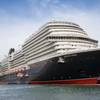Cummings Issues Statement on Deepwater
Mr. Speaker:
As Chairman of the Subcommittee on Coast Guard and Maritime Transportation, I rise today in strong support of H.R. 6999, the Integrated Deepwater Program Reform Act of 2008. This legislation is based on similar Deepwater reform legislation, H.R. 2722, which passed the House by a vote of 426 to 0 last year, and on S. 924, which passed the Senate by unanimous consent.
I recognize and thank:
· Congressman Oberstar, the Chairman of the Committee on Transportation and Infrastructure,
· Ranking Member Mica of the Committee on Transportation and Infrastructure,
· Ranking Member LaTourette of the Coast Guard Subcommittee,
· Chairman Thompson and Ranking Member King of the House Committee on Homeland Security,
· Chairman Inouye and Ranking Member Hutchison of the Senate Commerce Committee, and
· Chairwoman Cantwell and Ranking Member Snowe of that Committee’s Subcommittee on Oceans, Atmosphere, Fisheries and Coast Guard.
Each of these Members worked to craft the thoughtful and measured legislation before us – and I applaud their leadership and their dedication to ensuring effective management and oversight both of the United States Coast Guard and of taxpayers’ resources.
Mr. Speaker, since my appointment in January of 2007 as Chairman of the Subcommittee on the Coast Guard, the Subcommittee has worked to exercise careful oversight over the Coast Guard’s $24 billion, 25-year Deepwater procurements, through which the Coast Guard is replacing or rehabilitating its cutters and aircraft. Senator Cantwell has been leading a similarly aggressive oversight effort in the Senate.
Unfortunately, as the Subcommittee has examined in close detail, many of the acquisitions conducted under Deepwater have failed, including the nearly $100 million effort to lengthen 110-foot patrol boats, which yielded 8 unseaworthy vessels that have been removed from service.
The early Deepwater procurements failed because the Coast Guard did not have the systems and personnel necessary to manage large acquisitions. They failed because the Coast Guard left private sector contractors to police themselves. And they failed because Congress did not require of the Coast Guard full accountability for the billions of taxpayer dollars appropriated to support its acquisitions.
The Commandant of the Coast Guard, Admiral Thad Allen, has moved to strengthen the service’s ability to manage acquisitions, including creating a new acquisitions directorate and initiating structural and procedural changes to enhance its acquisitions workforce.
The service has taken conditional delivery of the first National Security Cutter, the Bertholf.
Having joined the Coast Guard in commissioning the Bertholf this summer, I know that it is a fine ship that will greatly enhance the service’s mission capabilities.
However, the Bertholf experienced significant cost overruns, and additional measures are needed to continue modernizing the Coast Guard’s acquisitions management systems because the service continues to face procurement challenges – and not only within Deepwater.
For example, the Rescue 21 program, which is intended to upgrade the systems the Coast Guard utilizes to locate those in distress at sea, is now hundreds of millions of dollars over budget and years behind schedule.
This week, the Congress and the nation are poised to bail out our financial system by putting on taxpayers the burden of paying to clean up the consequences of failed oversight.
The taxpayers have already shouldered the burden for the Coast Guard’s earlier failed procurements and for the failed procurements we have witnessed throughout the entire Department of Homeland Security – which, according to a tally compiled by the Homeland Security Committee, have wasted approximately $15 billion.
As a Representative elected by the citizens of Maryland’s 7th Congressional District and as Subcommittee Chairman, I believe that one of our most critical duties at this time is to implement every available measure to ensure that federal agencies are effective stewards of taxpayers’ money – and thus that the American people are never again left holding the bag for failed procurements.
The legislation before us today takes these steps with regard to the U.S. Coast Guard.
Specifically, the bill before us requires the Coast Guard to eliminate the use of private sector lead systems integrators by October 2011 – the same date on which their use is phased out in the Department of Defense.
However, it allows the Coast Guard to use a private sector lead systems integrator between now and that date for on-going asset procurements under certain circumstances, including when it is in the best interests of the government to do so.
This bill creates in statute the position of Chief Acquisitions Officer – and requires that it be filled with a fully qualified individual who can, at the Commandant’s choosing, be a civilian member of the senior executive service or a uniformed member of the Coast Guard but who must have a Level III Acquisitions qualification and 10 years of experience managing acquisitions efforts.
The bill requires independent, third-party certification of assets – and requires that appropriate testing be performed on asset designs so that problems can be identified before construction of an asset begins.
It also requires the regular submission of acquisition program reviews and updates to Congress – including notification of cost overruns and schedule delays – so that Congress is aware of emerging issues before they become crises.
In short, this bill brings common-sense oversight and management reform measures – many of them based on current practices within the DOD – to the Coast Guard. It also requires strict and appropriate accountability from the service for its stewardship of taxpayer resources.
These measures are critical to ensuring that the word Deepwater is never again a name synonymous with failure – and, most importantly, to ensuring that the nearly 42,000 men and women of the Coast Guard are equipped with state-of-the-art assets equal to the missions they will perform – and the challenges they will face – in the 21st century.
I urge my colleagues to support H.R. 6999 and with that, I reserve the balance of my time.










